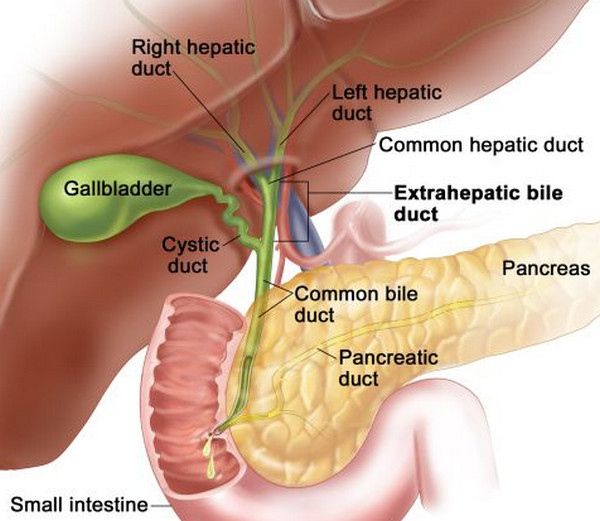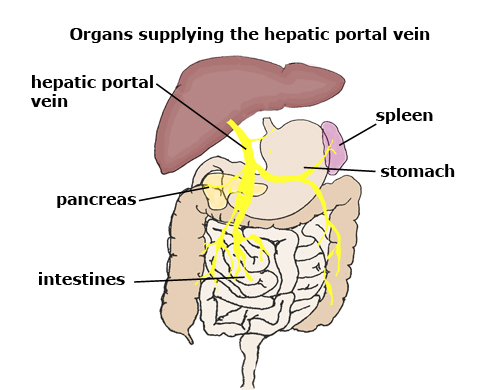Definition of "Pancreatitis"
Pancreatitis is inflammation of the pancreas (i.e. organ sitting under the stomach, which produces digestive enzymes).
Patient information
What is pancreatitis?Inflammation of the pancreas.
Ummm...  Why does it matter? What does the pancreas do?
Why does it matter? What does the pancreas do?
It's a digestive organ, that secretes digestive enzymes, helping with digestion, and absorbing nutrients in the small intestine.
- Epigastric pain (upper abdominal), which:
- Often radiates to the back
- Usually severe
- Nausea/vomiting
- Acute pancreatitis:
- Fever
- Sx typically resolve in a few days
- Chronic pancreatitis:
- Weight loss
- Fatty stool
- Diarrhea
Patient information
What does it feel like when the thing that makes digestive enzymes is inflammed?It can be painful, where your pancreas is. Which is at the upper part of the tummy. Because it lies behind your tummy, the pain usually goes into the back. Just like any inflammation, it can also cause systemic type things, like fever, nausea, vomiting.
How about if the thing that makes digestive enzymes is inflammed over a long time?
Because the pancreas creates digestive enzymes, it's going to affect digestion. This may cause weight loss. And fatty stool, because fat isn't broken down properly. And diarrhea.
- Acute pancreatitis
- Chronic pancreatitis
- Acute pancreatitis:
- Gallstones
- Heavy alcohol use
- Less commonly:
- Direct trauma
- Certain medications
- Infections, e.g. mumps
- Tumors
- Chronic pancreatitis:
- Many years of heavy alcohol use, commonly
- As a result of acute pancreatitis
- Hyperlipidemia
- Hypercalcemia
- Some medications
- Certain genetic disorders, e.g. cystic fibrosis
- Smoking increases the risk of both acute/chronic pancreatitis
Patient information
What causes inflamation of the thing that makes digestive enzymes?Gallstones are the big one. Alcohol use is the other biggie. There are also other things like trauma, drugs, infections, and cancers.
Wait... I thought gallstones are found in the gallbladder, the organ that stores bile? Hence the word GALL-stone. How is this related even to the pancreas?
The common bile duct. It is connected to the liver, through the "common hepatic duct". It is connected to the gallbladder, through the "cystic duct". It is connected to the pancreas, through the "pancreatic duct".

Source: 2013/03/gall-bladder-and-pancreas-anatomy-and-location.jpg">HealthFixIt
- Acute pancreatitis:
- 3x increase in the blood of either:
- Amylase
- Lipase
- 3x increase in the blood of either:
- Medical imaging, e.g. ultrasound and CT scan
Patient information
How do you know if someone has inflammed the thing which makes digestive enzymes?You see it on a picture. Because the pancreas is a soft tissue, you'd want to use an ultrasound or CT. You can also do bloods.
What will you see on bloods?
There will be a big increase in the number of digestive enzymes, in blood. So these include lipase and amylase. Lipase, which helps break down fats. And amylase, which helps break down starch.
- Acute pancreatitis:
- IV fluids
- Pain relief, which even in mild ot moderate cases can be severe, so a narcotic/opioid pain killer may be required. Generally morphine is suitable, but there is some controversy it constricts the sphincter of Oddi
- Antibiotics, sometimes
- No eating or drinking is allowed, typically
- Tube may be placed into the stomach
- ERCP (endoscopic retrograde cholangiopancreatography), to open the pancreatic duct, if blocked
- Removal of the gallbladder, in those with gallstones, oftenly
- Chronic pancreatitis, in addition to those for acute pancreatitis:
- Temporary feeding via NG tube, for adequate nutrition
- Long term dietary changes
- Pancreatic enzyme replacement, may be required
- Surgery to remove parts of the pancreas, occasionally
Patient information
What do you do inflammation of the thing that makes digestive enzymes?First, you address pain. If the patient isn't eating or drinking, you can give fluids, and feed them through a tube through the nose. It depends on what is causing the problem. You can give antibiotics, if that's the cause. If it's a gallstone, then an ERCP is done. You can also remove the gallbladder, which is called a cholecystectomy.
What is ERCP?
ERCP uses a scope, which is guided by an x-ray enhanced with contrast. You can both diagnose and fix stuff this way.
- Early complications, including:
- Shock
- Infection
- SIRS
- Low blood calcium
- High blood glucose, diabetes
- Dehydration
- Problems with other organs, including:
- Kidney failure, in turn due to:
- Blood loss, bleeding
- Dehydration
- Ascites (fluid leaking into the abdominal cavity)
- Respiratory complications, often severe, including:
- Pleural effusion
- Shallow breathing from pain, causing lung collapse
- Lung inflammation, due to pancreatic enzymes attacking the lungs
- Abdominal, including:
- Intra-abdominal hypertension, due to severe inflammation
- Abdominal compartment syndrome, due to severe inflammation
- Kidney failure, in turn due to:
- Late complications, including:
- Recurent pancreatitis
- Development of pancreatic pseudocysts (i.e. collections of pancreatic secretions that have been walled off by scar tissue). These may cause pain, become infected, rupture, bleed, block the bile duct, cause jaundice, and migrate around the abdomen
- Pancreatic abscess (i.e. collection of pus due to necrosis, liquefaction and infection), due to acute necrotizing pancreatitis
Patient information
What can happen as a result of inflamming the thing that makes digestive enzymes?The biggie that we're concerned with the pancreas, is it's connection with the blood system. The small intestine, spleen, and pancreas, all have a commonality, in that it drains into a blood vessel which feeds the liver, where all of that blood gets cleaned up. So. If you get inflammation of the pancreas... Houston, we have a problem
 !
!
So blood is going to become infected?
Exactly!! So you can have a blood infection, and it can even cause damage to other end organs, like the kidneys, the lungs. The pancreas is also chilling out close ot other abdominal organs, so that can cause problems in that region too.
There are some LATE complications of inflammation of the thing tha tmakes digestive enzymes. What are these?
It's the same with anything that's inflammed over and over again. So you can get scarring of tissue, which can wall off pancreatic secretions, called pseudocysts. You can also get collections of pus that are walled off, called an abscess.

Source: U Cumberlands
- Severe acute pancreatitis has mortality of 6%, higher where necrosis of the pancreas has occured
- Scoring systems are used to predict the severity of an attack of pancreatitis, combining demographic and lab data to estimate the severity and probability of death, including APACHE II, Ranson, BISAP and Glasgow. For example, BISAP which can be done at the bedside, is:
- BUN >25mg/dL
- Impaired mental status
- SIRS
- Age>60yo
- Pleural effusion
Patient information
How can you guess how bad inflammation of the thing that makes digestive enzyme, will be?We ask questions about how well the patient is, with the mnemonic BISAP. So we look at urea, which looks at the function of the kidneys. We check the patient's mental status. We see whether there's signs that the inflammation has gone to blood, called SIRS. Old age, always makes things worse. And seeing if there's fluid collected between the 2 pleural layers surrounding the lungs, which suggests the inflammation has hit other organs.
- Acute pancreatitis occurs in 30 per 100k
- Chronic pancreatitis occurs in 50 per 100k in the USA
- Incidence of chronic pancreatitis occurs in 8 per 100k per year
- Pancreatitis occurs in 123k deaths per year, up from 83k deaths in 1990
- Pancreatitis is more common in men, than women
- Chronic pancreatitis often starts between the ages of 30-40yo, and is rare in kids
- Cholecystitis (inflammation of the gallbladder, cf. the pancreas)
- Cholangitis (inflammation of the biliary tree, cf. the pancreas)
- Pancreatic cancer
- Acute pancreatitis
- Chronic pancreatitis
Find a practitioner
Practitioner count: 0